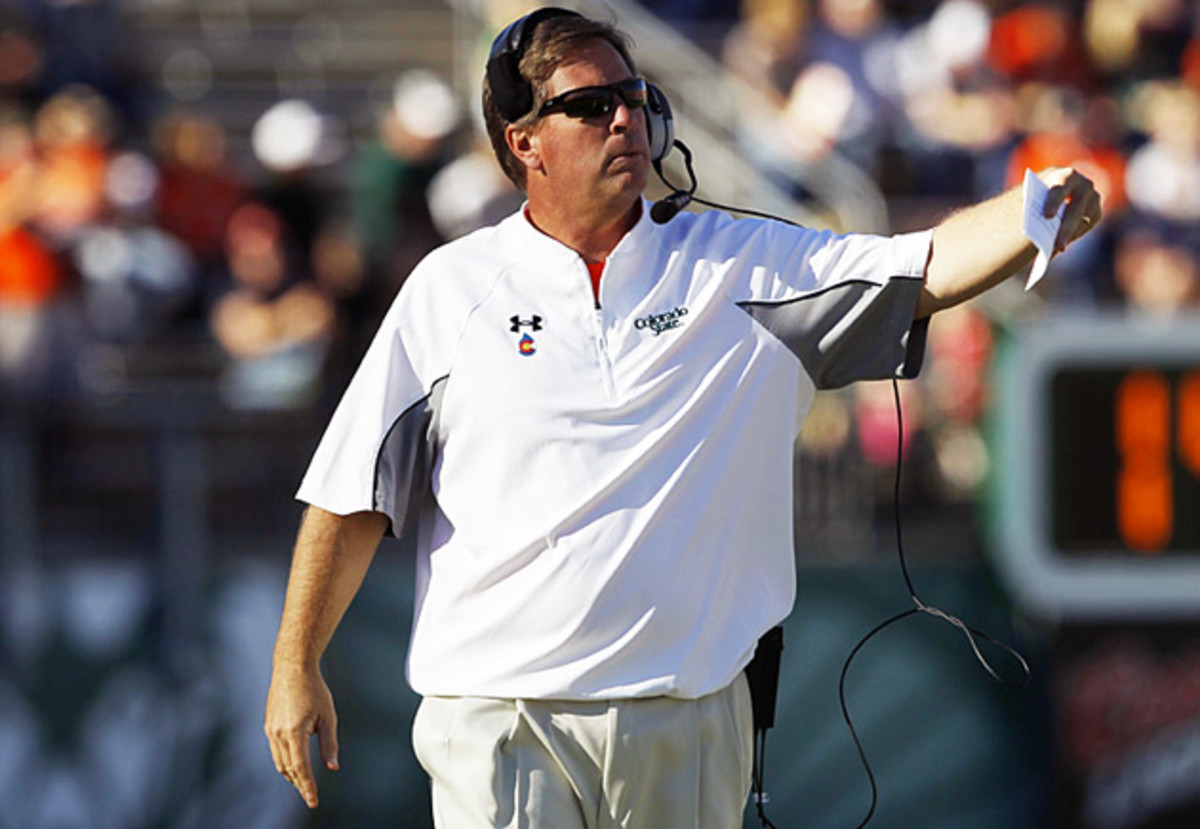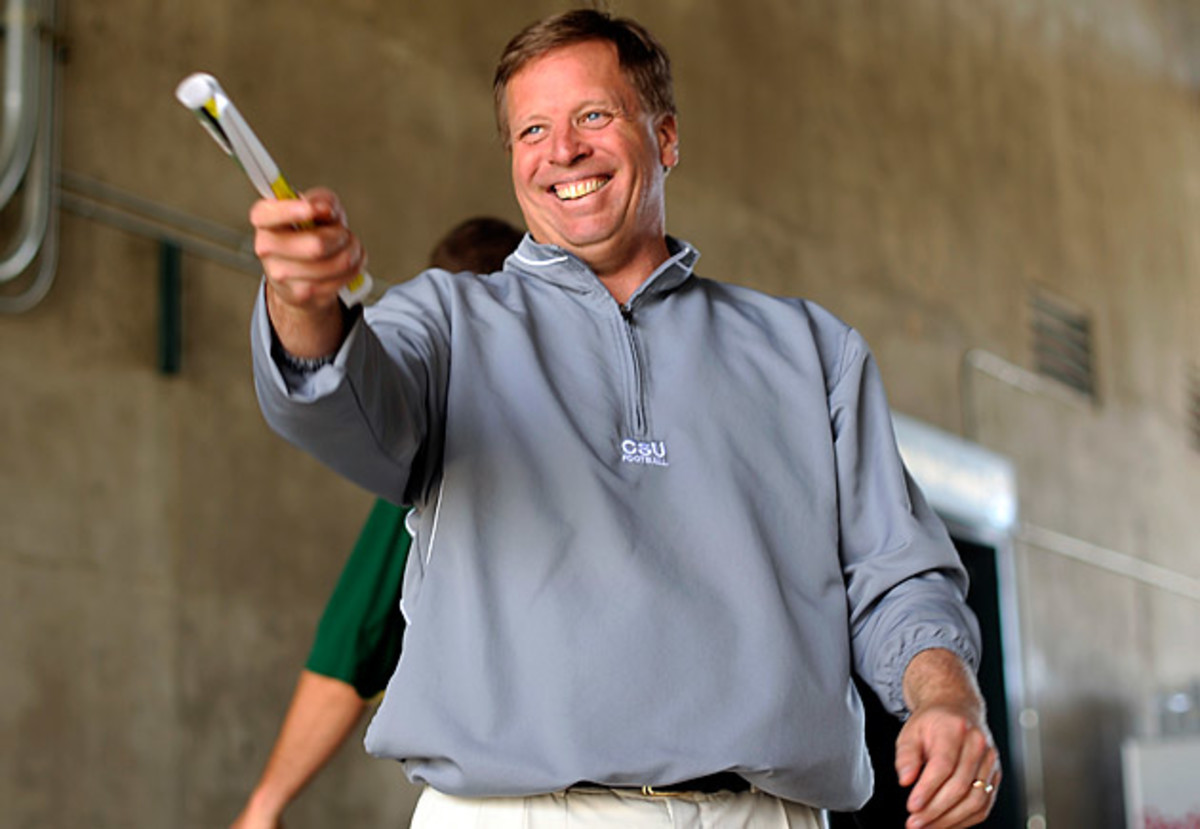Big price, big results? Jim McElwain will face lofty expectations at Florida

One of the first things Jim McElwain noticed when he took over as Nick Saban’s offensive coordinator at Alabama in 2008 was the 18-month calendar. Saban had his life and the lives of his assistants sketched out for the next year and a half. It seemed a bit much to McElwain at first. Then, after he had been at Alabama for a while and realized he was rarely surprised by anything because it was already on his calendar, he embraced it. So, one of the first things McElwain did when he became Colorado State's head coach was fill out an 18-month calendar. “Guys understand the expectations, so there aren’t a lot of surprises,” McElwain told SI in an interview a month before his first Colorado State season in ’12. “Surprises put you out of kilter. If you anticipate those surprises, they don’t become big things.”
This is the part where the Florida fans will stop reading and start swearing. Great, they’ll say. Another Nick Saban knockoff. Didn’t the Gators just have four seasons with a Saban disciple in Will Muschamp? How did that work out? Now they’ve hired another one?
Well, not everyone has the same skill set. Remember, Gators, another Saban devotee lives in Tallahassee with a national championship ring from last season and a team that hasn’t lost since November 2012. Maybe you just need to hire one of Saban’s former offensive coordinators. It worked for Florida State with Jimbo Fisher. We’ll find out if it will work for Florida and McElwain.
• STAPLES: How can each playoff contender get into the top four?
Can McElwain win in Gainesville? I don’t know. Neither do you. Neither does anyone. The problem with hiring head coaches at college football's highest level is it’s impossible to know if they can succeed until they actually do. Some offer more predictive evidence than others. When Florida hired Urban Meyer away from Utah 10 years ago, Meyer’s Utes had just busted the BCS. Everyone wanted him. He won a national title in his second season with the Gators. When USC hired Pete Carroll, he had just failed as an NFL head coach. No one wanted him. Everyone wanted Mike Riley, who was hired by Nebraska on Thursday. Carroll only became college football’s most dominant coach for a decade.
McElwain has taken a job with only two requirements: Win championships every year, and do it with style. Florida has the nation’s most spoiled fan base. Three football and two men’s basketball national titles in a 12-year stretch (1996-2008) will crank expectations to unreasonable levels. The seeds for that attitude were planted when Steve Spurrier arrived in ’90 and immediately made the rest of the SEC bow before him. Florida, previously a perennial SEC also-ran, suddenly was the hottest program in the league. Fans grew accustomed to vertical routs and five-touchdown blowouts, and the desire to recreate those days has not dissipated. Even after Meyer won the first of his two national titles in ’06, some still grumbled that he didn’t win games the way Spurrier did. Though league-wide improvement has rendered such dominance virtually impossible, the expectation hasn’t changed.

But McElwain has worked at Alabama, where the only job requirement is to win every single game. He probably won’t be intimidated by the desires of his new stakeholders. He’ll fill out that 18-month calendar and draw up a detailed list of duties for each employee in the program. This is something Saban does at Alabama and Fisher does at Florida State. It’s something McElwain did when he arrived at Colorado State and found a program that had grown comfortable with losing during former coach Steve Fairchild’s tenure. This way, everyone in the organization knows his or her responsibilities and will be empowered to own those rather than wonder who should be doing what.
McElwain inherited a Rams program that had gone 3-9 in each of its previous three seasons. He won four games in his first year, eight in his second and 10 this fall. That’s a great trajectory. But McElwain’s team did not win the Mountain West’s Mountain Division. Boise State and first-year coach Bryan Harsin did. Unlike when Florida landed Meyer in 2004, there was no slam-dunk mid-major hire this year. McElwain was the most promising one, but he’ll have to prove quickly that he is worth what the Gators paid to get him.
McElwain agreed to a 10-year contract extension this summer that included a $7.5 million buyout. It also included language that suggested the buyout could be negotiated down if a “dream job” came along. Here is the relevant clause: “… in the case or event of extenuating circumstances the University's President shall have the discretion, but not the obligation, to reduce in whole or in part McElwain's obligation to pay Liquidated Damages to the University. McElwain shall have the right to request that the Parties engage in a good faith discussion of such Liquidated Damages amount prior to McElwain providing formal notice to the University of his decision to terminate this Agreement without cause, and in such event the University agrees to engage in such discussion, although the University has no obligation to reduce in whole or in part McElwain's obligation to pay Liquidated Damages, with an understanding and acknowledgement that time will be of the essence in coming to a final decision.”
This was an odd addition to the contract, because a university always has the option to reduce or waive a buyout owed to it. The clause also seems to be one of the reasons Colorado State president Tony Frank fired athletic director Jack Graham in August. Graham told CBSSports.com’s Dennis Dodd on Thursday that the original plan was an “ironclad” buyout with no insinuation that it could be reduced. "Mac's lawyer pushed the question out there: Could the president -- if the dream job comes along -- wave or seriously lower the breakup fee?” Graham told Dodd. “The president said yes. In effect he gave permission for Mac to listen to [Florida athletic director] Jeremy Foley. We were married for 10 years. I thought it was incredibly naïve and irresponsible.”
Florida and Colorado State reached an agreement on a reduced buyout Thursday. We know this because the Denver Post reported it and also because the school later sent out a press release celebrating the largest buyout in college football history. Colorado State will get $5 million plus $2 million for a game between the Rams and Gators at Florida Field in a future year. That guarantee game might still be above market value when it is played, but it will be less than $1 million more than Florida would have spent for such a game anyway.
Still, the $5 million cash outlay, when added to the $8 million Florida must spend to fire Muschamp and his staff, makes this an expensive change. McElwain will need to produce at that price.
McElwain will inherit a team brimming with defensive talent, especially in the secondary. Vernon Hargreaves is one of the nation’s best cornerbacks, and Jalen Tabor and Duke Dawson showed promise as freshmen. But McElwain was hired for his offensive expertise, and that side of the ball has been a mess since Tim Tebow left following the 2009 season. If junior left tackle D.J. Humphries turns pro, the Gators will need at least three new offensive line starters. Freshman quarterback Treon Harris provided a stopgap after the benching of Jeff Driskel, but it isn’t clear if Harris has the arm to be the long-term solution. Could fellow freshman Will Grier be that guy? Maybe. McElwain, who landed AJ McCarron during his time at Alabama, will certainly try to recruit his own guy. And if he finds the current choices lacking, he may need to hit the graduate transfer market.

That 18-month calendar should come in handy when it comes to quarterback recruiting. McElwain will likely include the following notation on the first Wednesday of every February: “Sign a top quarterback!” The Gators signed two in Muschamp’s first class (Driskel and Jacoby Brissett), then signed projects in 2012 and ’13 (Skyler Mornhinweg and Max Staver) and two more highly recruited quarterbacks in ’14 (Harris and Grier). That two-year gap between the Driskel-Brissett class and the Harris-Grier one is a reason why the Gators went 4-8 in ’13 and struggled offensively in ’14. Driskel nailing down the starting job in ’12 led to Brissett’s transfer, and in ’13 there wasn’t anyone left on the roster capable of quarterbacking an SEC contender. Then, when Driskel proved ineffective coming back from a broken leg, there were no experienced options to replace him.
Even if McElwain doesn’t land his quarterback of the future for 2015, his schematic history suggests he can make something work with the talent he has on the roster. At Alabama he used a lot of under-center, two-back, power-run plays. This is what Muschamp originally envisioned working at Florida, but neither Charlie Weis nor Brent Pease could sustain success with that approach. However, even with the nation’s best offensive line and a deep stable of backs at Alabama, McElwain wasn’t afraid to go three and four wide from the shotgun or to speed up the tempo. At Colorado State he mixed heavy under-center formations with shotgun spread and Pistol looks. His offense, it seems, is whatever it has to be. “He is able to sell a game plan as well as anybody,” former Alabama quarterback Greg McElroy said of McElwain on the SEC Network Thursday. “He adapts to the personnel he has.”
• ELLIS: Is new Nebraska head coach Mike Riley really an upgrade?
That will be critical if McElwain wants to succeed at Florida, because he will inherit some players who were recruited to run Pease’s offense and others recruited to run Roper’s one-back spread. If he can’t adapt, as Meyer was forced to do after getting crushed by Alabama and losing at LSU in his debut Florida season in 2005, then McElwain will suffer the same fate as his predecessor. If he can adapt, he has the athletes on the roster to return Florida to SEC title contention quickly.
Don’t expect McElwain to blame any early misfortune on the situation he inherited. One of the first things McElwain did at Colorado State was draw a picture of a bus on the grease board in the staff meeting room. The first time anyone tried to pass the buck to a coworker for a screw-up, McElwain wrote that person’s initials inside the bus to remind everyone who threw whom under the bus. “No one wants their name on the bus,” McElwain said. “No one wants to be known as that guy who is always trying to peddle something off on someone else.”
McElwain won’t get a chance to make any excuses at Florida. Given the amount the Gators had to pay to get him, he’ll be expected to win immediately. But let’s face it. He would be expected to win immediately if the buyout had been $7 instead of $7 million. McElwain has the pedigree. He has the experience. Can he turn those into victories at Florida? That’s entirely up to him.
